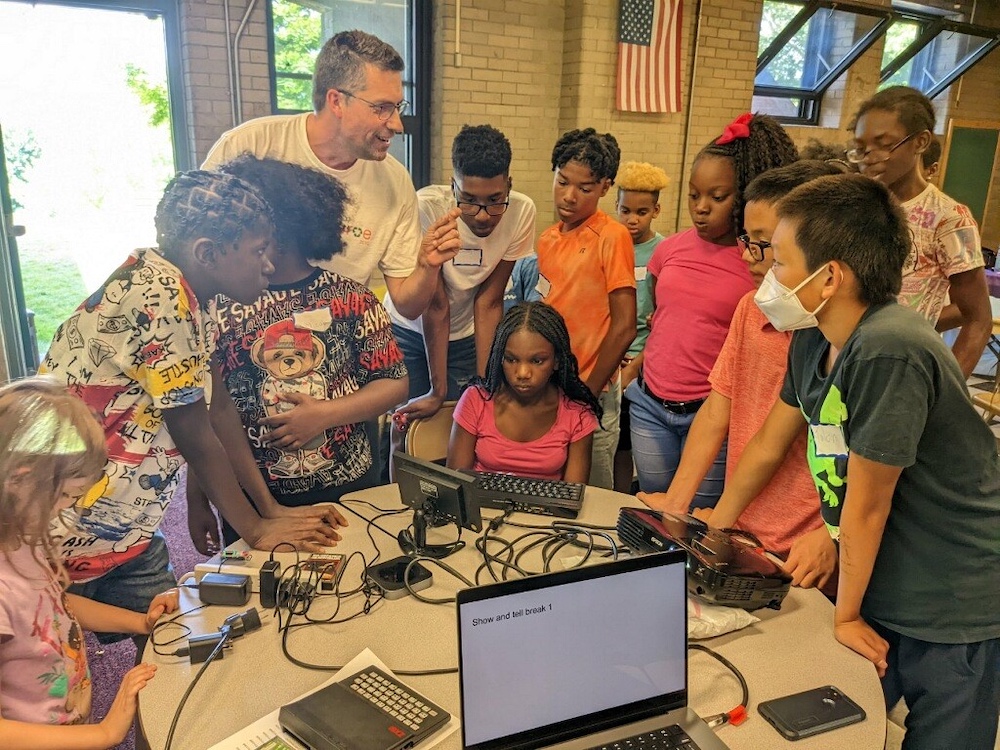Not every school has the means to provide computer science education. In Pennsylvania, about 63% of public high schools offer courses in the field.
Pittsburgh’s STEM Coding Lab wants to ensure that all students have access to it anyway — and earlier. By venturing into classrooms during school hours, hosting after-school programs or running the summer camp it recently wrapped up, the 2017-founded nonprofit fills in the gaps by offering STEM (science, technology, engineering and math) classes to elementary and middle school students. The hope is to build a foundation that could help them into the tech industry as adults.
“We start kids off with the fundamental concepts of computer science and then we scaffold the education up from there to ensure that they’re engaged in the stuff that they’re already interested in,” Executive Director Casey Mindlin told Technical.ly. “Kids are on their phones or tablets throughout the day anyways, so we want to harness that interest in digital platforms and digital resources, and provide kids with the resources and skills necessary to be creators, rather than just users of technology.”
Over the last decade, youth-centric pathways into Pittsburgh’s tech industry have become more common, with courses in public and private schools alike aiming to bring early experiences in coding, 3D modeling and other skills to students. But school resources and funding can be limited, so other Pittsburgh youth organizations in STEM remain to pick up the slack.
The hope is that early exposure to STEM will result in an increased likelihood of entering the field later on — and a more diverse pipeline for a predominantly white, male industry. By giving more students a chance to have hands-on experiences in robotics or coding or other STEM disciplines, the programs not only broaden youth ideas of what a career in tech could look like, but create a more robust local talent pool for the immense volume of tech jobs that go unfilled.
At STEM Coding Lab, since program leaders never want a lack of previous experience to be a barrier to a student getting involved in STEM, sometimes, they start simple. A class could focus on learning about algorithms by relating the definition back to everyday life experiences, for instance. The lab also tries to build on whatever lessons the schools they’re visiting are already teaching. Once students have a fundamental understanding of the material, they gain access to specialty classes in animation, gaming, web design and robotics.
“The schools that we serve invite us in because they either don’t have the resources or the budgetary resources to offer a foundational course themselves,” Mindlin said. “They don’t have the teachers, and they don’t have the wherewithal necessary to understand the full scope, or implement the full scope of CS education.”

STEM Coding Lab reports that it has experienced 275% growth over the past year and gained a host of new partnerships that Mindlin hopes will further its mission. Furthermore, the ED said he’s grateful for the 17 new funders the org has acquired, which has meant STEM Coding Lab has already been able to hire four new teachers. This past April, it was awarded a $250,000 grant from the Richard King Mellon Foundation. Additionally, it’s found support from the likes of the Pittsburgh Foundation, McElhattan Foundation and Duquesne Light Co.
Although taking their programs directly into schools and community centers has been STEM Coding Lab’s primary outreach method, this fall, Mindlin and his team plan to take their classes directly to students’ homes through a Wi-Fi on Wheels (WOW) CyberBus. Created through partnerships with the Housing Authority of the City of Pittsburgh and the Jerome Bettis Bus Stops Here Foundation, the STEM Coding Lab will travel with a bus equipped with laptops, Chromebooks and robotics equipment to five public housing communities across the city to teach computer science programming.
“We are going wherever there are opportunities to inspire young minds with computer science education,” Mindlin said.
The North Side-based organization has served roughly 1,400 students during the 2021-2022 school year with plans to serve many more. STEM Coding Lab also counts partnerships with 20 organizations that range from YMCAs to Pittsburgh Public Schools. Since preparing for future tech jobs is one of the org’s goals, it also regularly brings in volunteers from companies such as Google and PPG to discuss what a future in the field could look like.
In time, Mindlin said, the goal is to continue educating Pittsburgh students about their options in the region’s tech industry so that they have the skills needed to fill the tech talent gap, and to meet Pennsylvania’s future needs, especially. Robotics capital of the world, anyone?







